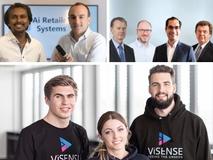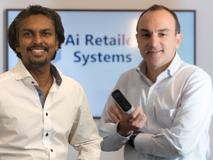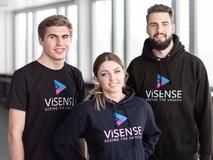CHF 40,000 for startups empowering retailers with AI, revolutionizing analytical testing for health and monitoring machine incidents
20.08.2021
AI Retailer System, Bionter, and VISENSE each win CHF 40,000 in Venture Kick’s second stage of financial and entrepreneurial support: Their projects provide an ultra-convenient retail experience & help retailers combat theft, revolutionize analytical testing to improve people’s health, and enhance the monitoring of machine incidents.
 |
 Ai Retailer Systems: COO Maran Pereirasamy and CEO Alejandro Garcia
|
 Bionter: form left to right, Board Member Mark Funk, Board Scientific Advisor Hanns-Christian Mahler, CEO Tobias Werk, and Board Reinhard Vogt
|
 VISENSE: from left to right, CTO Marvin Thiele, CEO Pia Spori, and COO Christian Reich
|
AI Retailer Systems: Empowering retailers to checkout-free convenience
Convenience retailers address on-demand consumer needs for food & grocery (330 Bil. CHF market in DACH). Running convenience stores the conventional way come at high operational cost. Retailers leverage the daily commute between home and work to locate stores at high footfall locations i.e. inner cities, transit points and fuelling stations to be profitable. Post-Covid, this daily commute is no longer a given. While some players start to experiment with Quick-Commerce, a delivery service within 1 hour for online orders, it is proving neither economically nor ecologically viable for small basket sizes inherent with on-demand needs. Retailers urgently need a viable last mile solution, one without the shortcomings of conventional point of sales (POS) which are ‘black boxes’ as there is no transparency on the shopper and staff interactions with items. The ETH Zurich spin-off AI Retailer Systems — comprising CEO Alejandro Garcia, COO Maran Pereirasamy, Head of Software Alex Popovic, and Head of Computer Vision Roland Mörzinger—addresses this issue.
AI Retailer Systems develops Computer Vision based SaaS solutions to help convert convenience retail space into autonomous stores that can be operated viably anywhere, 24/7 and allows ultra-convenient shopping without needing shoppers to queue and self-scan. In addition, the solution empowers retailers to reduce theft and streamline operations both at the POS and in the back-office with detailed in-store and item-on-shelves analytics. It can be deployed in new and existing convenience stores with minimal sensors ensuring low upfront installation costs. With conservative estimations looking alone at the DACH grocery sector, AI Retailer Systems looks at a total addressable market of CHF 3.1 billion, with further upside potential with video surveillance and loss analytics. AI Retailer System has welcomed interested investors as it is closing its Seed round over the next few months.
The team plans to use the Venture Kick funds to continue with the product development and the execution of the existing pipeline of projects. airetailersystems.com
The team plans to use the Venture Kick funds to continue with the product development and the execution of the existing pipeline of projects. airetailersystems.com
Many liquid drugs contain particles that are critical for patient safety. Sub-visible particle testing is mandatory for any biopharmaceutical preparation during stability testing, drug formulation and process development, and in-process control. However, the technology fulfilling compendial requirements was originally designed to check hydraulic oil used in aerospace and not tailored to the pharmaceutical need. Until today the commonly used technology comprises many manual steps and destroys the sample during testing. The overall particle counter market is over half a billion USD.
Bionter’s team—comprising Tobias Werk, Prof. Hanns-Christian Mahler, Reinhard Vogt, and Marc Funk—works together with the Centre Suisse d’Electronique et de Microtechnique (CSEM), ADS engineering, Pragma Engineering, and Nolato Treff on their first in the first family of tailored solutions for the Drug Product sector: Bionter’s PC100. The revolutionary analytical testing device—supported with single-use consumables, maintenance, and training services, for the biotech’s drug product sector—is based on a new combination of light obscuration technology and smart automation. Different from the existing technologies, Bionter’s PC100 works non-destructively. It requires a smaller sample volume, which can be used for another testing, thus reducing costs. Its smart automation workflow drives efficiency, minimizes human interaction, and improves reliability, data integrity, and patient safety. It also stays compliant with current regulatory requirements, offering a low product-entrance barrier.
The Venture Kick Stage 2 funds will be used for business development until first direct sales to customers. bionter.com
VISENSE: Monitoring machine incidents
Production downtime due to machine errors during a machine’s life cycle is a massive and expensive problem for industrial manufacturers. Manufacturers lose between 5%-20% of their production capacity to downtime, creating up to USD 80,000 in losses per minute. To reduce this downtime, the causes of errors need to be identified as quickly as possible and prevented in the future. However, these processes are still highly manual and unstandardized in many companies.
VISENSE is a remote error diagnosis solution that provides real-time insights into industrial machine errors. A hardware kit is installed on an underperforming machine in a quick, non-intrusive set-up. The VISENSE solution includes cameras, sensors, network equipment, and an edge computing unit to automatically record and sequence camera footage of error incidents during the production process. The footage gets enriched through additional machine data and machine-learning-based data analytics (e.g., optical flow analysis), identifying regions of interest. This enriched data is made accessible in a globally available platform, which assists in optimizing the processes around the machine (reporting, ramp-up, etc.) and improving the communication between the various stakeholders.
VISENSE comprises CEO Pia Spori and COO Christian Reich, both from the University of St. Gallen (HSG); CTO Marvin Thiele from Hasso Plattner Institute (HPI); and advisors Dr. Markus Grüneisl (BMW), Prof. Dr. Falk Uebernickl (HPI) and Dr. Mark Kohler (ITMP). The startup’s market can be defined by the number of industrial robots representing the ideal use case for the solution. There are approximately USD 2.7 million operational industrial robots worldwide, bringing the total available market to USD 19 billion. About 10% of these robots are critical or underperforming. In Europe alone, this results in a market of USD 417 million.
VISENSE will use the Venture Kick funds to accelerate the product development and invest in hardware components (cameras, sensors, edge computing unit) needed to identify the ideal configuration of their diagnostic kit. visense.io


